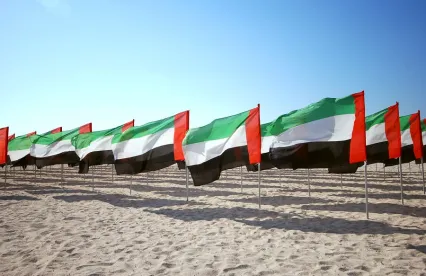The United Arab Emirates (the “UAE”) continues to lead the Arab world in terms of its anti-bribery and corruption (“ABC”) endeavors. The UAE offers a business-friendly environment with an effective and efficient public administration; it criminalizes active and passive bribery, embezzlement, abuse of functions, and facilitation payments, it enforces its domestic ABC legislation and it continues to work with international partners to combat bribery and corruption.
Transparency International’s Corruption Perceptions Index
Transparency International, a nonprofit and non-governmental civil society organization that leads the international fight against corruption, releases an annual Corruption Perceptions Index (“CPI”) that ranks 180 countries worldwide according to perceived levels of public sector corruption. Transparency International determines the CPI rankings through expert assessments and opinion surveys. It then awards each country a score from zero (representing a high level of corruption) to 100 (representing no corruption). Using these scores, Transparency International then ranks each country from one to 180.
The UAE’s Historical Rankings
In 2002, Transparency International first ranked the UAE 37th out of 133 countries. In both 2019 and 2020, the UAE placed 21st out of 180.
Most recently, in 2021, the UAE placed 24th. While a slight drop from the preceding years, the UAE maintained its position as the least corrupt country in the Middle East and North Africa (“MENA”) region and continues to surpass many other non-MENA countries, including the United States, South Korea, Spain, Portugal and Italy.
Recent ABC Updates
We have written previously written on the UAE’s modernization of its ABC legislation, which brought it very much into line with developed regimes in other jurisdictions. See, for example, our earlier blog post here, which sets out the key features of the new law.
In this post, we examine some of the other positive steps the UAE has taken in recent times to continue the fight against bribery and corruption, which would not have been captured by the CPI since the CPI only measures perceived public sector corruption.
Enforcement Activity
First, we concluded our earlier post by predicting that the modernized law foreshadowed an increase in enforcement activity, and a number of recent prosecutions appear to suggest that forecast has come true.
For example, one investor was jailed for a year for offering an AED 10,000 bribe to a customer service employee at a government center.
The investor wanted the official to change the investor’s company from a management consultancy to an investment fund manager without presenting the necessary documentation. The official did not accept the bribe but instead reported it to the Department of Economic Development and Dubai police.
Financial Secrecy and Money Laundering Reform
Second, and similar to the overhaul of the UAE’s ABC legislation, the UAE has also undertaken a series of actions to develop and deploy a sophisticated financial crime compliance framework that is in line with the expectations and recommendations of the Financial Action Task Force (“FATF”), an intergovernmental policymaking body whose purpose is to establish international standards, and to develop and promote policies, both at national and international levels, to combat money laundering and terror financing.
For example, the UAE issued a new anti-money laundering and counter-terror financing (“AML/CFT”) law in October 2018 (see our analysis here), which established an Executive Office of AML/CFT to oversee the implementation of the UAE’s National AML/CFT Strategy and National Action Plan and a specialized new court to focus on combating money laundering (see our analyses here), and it issues periodic guidance to financial institutions and designated non-financial businesses and professions (known as “DNFBP”s) on how best to comply with the law (see e.g., our analysis of the June 2021 guidance on suspicious activity/transaction reporting here).
Private Sector Reform
Third, the UAE has introduced reforms in practices and transparency in reporting and registering beneficial interests and nominee directors.
In brief, Cabinet Resolution No. (58) of 2020 regulating Beneficial Owner Procedures (the “Resolution”) introduced new requirements for UAE entities to disclose their beneficial owners. The main purpose of the Resolution is to enhance the transparency of entities registered in the UAE, improve corporate governance, and prevent financial fraud and tax evasion.
Additional Considerations
Acting on an international warrant issued by South Africa in respect of widespread bribery, corruption and misappropriation of state assets, Dubai police recently arrested Atul and Rajesh Gupta. They are now awaiting extradition pursuant to a 2018 extradition treaty between the two countries, ratified in 2021. Even more recently, the UAE announced its intention to sign seven new extradition agreements this year in order to fight corrupt activities.
These steps underscore a concerted push by the UAE to prevent its misuse by financial criminals seeking to safe harbor illicit funds.






 />i
/>i

